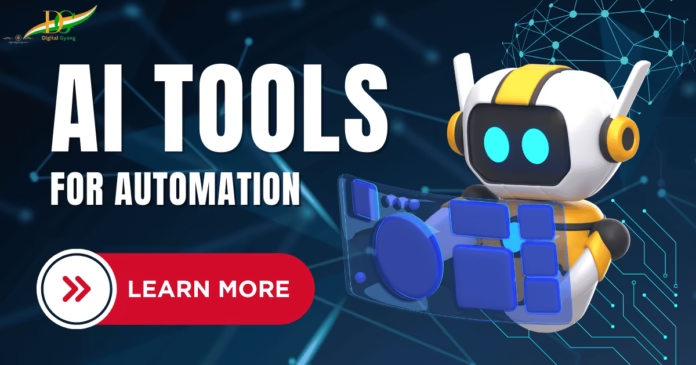Introduction
Businesses together with developers and enterprises use AI Tools for Automation at present to quickly optimize workflows and achieve higher accuracy while minimizing human labor. AI automation segments industries by providing automated systems that conduct self-learning and adjust their performance automatically to advance through time. Businesses can find multiple AI test automation tools at different pricing points in the market to revolutionize their productivity levels. This article delves deep into the best AI automation tools, their benefits, and how they can transform various industries.

What are AI-Based Automation Tools
The targets of AI-based automation tools achieve success through an artificial intelligence (AI) partnership with machine learning frameworks that automate operations across multiple industrial sectors. Automatic decision making and workload reduction emerge as main features in these tools through their ability to process data.
Various industrial sectors apply automated AI solutions that span across software testing activities alongside customer support operations and business management automation and robotic process automation (RPA) operations. The tools execute their functions effectively through AI capabilities which let them adapt to changing environments while autonomously learning from previous acquired knowledge to perform accurate complex tasks. Businesses gain two advantages from AI automation system through data-driven analytics which helps maximizes industrial productivity while minimizing operational costs.
Providing a review function of software development through AI-based automation testing tools generates compatible intelligent test runs and predictive data analysis for early issue detection. Through their integration AI and workflow automation tools advance the capability of businesses to provide continuous automated help systems for their clients.
Best Freelance Websites for Digital Marketing
Companies now use AI tools with NLP and deep learning capabilities to develop solutions which support operations in finance sectors and healthcare services and e-commerce businesses and manufacturing production facilities. Market leadership develops in business operations automated by AI because these operations become smarter and more efficient through their enhanced productivity.
Combining artificial intelligence with mechanism learning allows AI-based automation tools to transform work activities through human-free operations thus leading to improved operational success. AI-based automation tools run through multiple software testing procedures to fulfill their operations in business process automation while providing customer support.
Why Use AI-Based Automation Tools?
- AI operates to eliminate the errors produced by humans during automated processes.
- Algorithms in automation that AI drives lead to accelerated execution times of repeated tasks.
- Free AI automation test platforms provide advanced functionalities at low or no cost.
- AI possesses a capability to adapt its functions according to changing business needs.
- Around the time of decision-making AI uses data patterns to improve operational procedures.
Top AI Tools and Automation in 2025
Businesses leveraging AI-based automation testing tools acquire the ability to unlock the potential of automation for their operations. The market offers several top-quality solutions which are available in 2025.
1. Selenium with AI
As an open-source framework Selenium remains a top choice in automated testing since its updates include predictive analytics and self-healing test scripts together with AI-driven test automation functionalities.
2. TestRigor
TestRigor serves as an AI automation testing tool which allows non-coder users to develop strong test cases through the use of natural language processing capabilities.
3. Mabl
Mabl stands among the leading AI-driven continuous testing platforms that provides better test execution through AI-driven insights and self-adaptive testing features.
4. Applitools
Businesses use Applitools’ AI-driven visual validation technology to maintain uniformity across web interfaces which lowers the effort needed for testing the same interfaces.
5. Katalon Studio
Katalon Studio serves as a top AI automation based test tool that includes smart test execution and AI-powered defect prediction functionalities alongside CI/CD pipeline integration.
6. UiPath
As the market leader in robotic process automation (RPA) UiPath implements, AI automation-driven bots to automate workflows and process data as well as create business intelligence.
7. Tricentis Tosca
The AI-based tool from the next generation offers scriptless automation features to enterprises with intelligent test optimization capabilities.
8. ACCELQ
Through AI-powered automation ACCELQ provides users with codeless automation tools in addition to automated test management functions and automated self-healing features.
9. Leapwork
This AI automation tool provides an interface that allows non-technical personnel to create automated workflows by replacing traditional coding requirements.
10. Avo Assure
This AI-based no-code test automation platform works with more than 200 applications to deliver total automation capabilities to businesses.
The tools implement smarter innovations during 2025 which drive productivity and performance improvements along with creating better accuracy levels throughout various industries.
Businesses that wish to leverage AI automation functions use top-level AI-based automation testing tools for these purposes. Multiple tools stand among the top choices which can be listed as follows:
1. Selenium with AI
Companies use Selenium as their preferred open-source test automation framework which recently obtained enhanced AI-driven testing operations. AI helps with predictive analysis, self-healing scripts, and robust test execution.
2. Test.ai
Test.ai functions as a computerized test automation tool which provides mobile and web testing capabilities through AI automation based technology. The platform implements machine learning algorithms which detect graphical user interface modifications before updating its testing methods accordingly.
3. Mabl
The AI-powered Mabl platform functions as a constant testing solution which employs machine learning technology for automatic test automation repair. The tool brings better test execution results and reporting skills through smart insights.
4. Applitools
The AI-powered visual testing feature embedded in this tool assesses application functionality to verify that UI differences do not lead to system failures.
5. Katalon Studio
This automation testing platform uses AI capabilities to operate with Selenium and Appium and includes functionalities for AI-based analytics and test recording operations.
6. UiPath
The AI-based automation tool UiPath leads the industry for robotic process automation (RPA). The tool executes repeated workflows automatically and enhances precision and workflow connection with enterprise infrastructure.
7. Tricentis Tosca
AI-powered enterprise application automation tool enhances both automation framework scalability and cuts down maintenance time.
Trending AI Apps, Chatbots, and Automation Tools
Highly advanced AI-powered chatbots along with applications continue to evolve while developing trends which boost automation and efficiency levels. Several outstanding AI-powered apps and chatbots exist in the market today.
1. ChatGPT
OpenAI created the sophisticated AI chatbot named ChatGPT that responds to inquiries while producing texts and helping users with code development and automation.
2. Google Bard
This AI-powered chatbot delivers real-time Google-based information and research together with productivity tools to assist users in their tasks.
3. Jasper AI
Jasper AI functions as a leading AI writer that enables businesses to produce marketing content and create blog articles together with search-optimized material.
4. Replika
Artificial intelligence delivers this tool to create interactions that mimic human interactions for therapeutic purposes as well as to provide user connections.
5. Copy.ai
The AI-powered platform Copy.ai enables business users to create effective marketing content as well as advertising texts and email correspondence.
6. Zapier
Zapier operates as an automation platform which lets users connect different software solutions through its application integration system.
7. Make (formerly Integromat)
This AI automation enabled framework makes users create automated processes across different systems using minimal coding requirements.
8. Claude AI
Claude AI which Anthropic has created provides a secure conversational AI solution for businesses through its ethical AI interaction.
9. Hootsuite OwlyWriter
The Hootsuite OwlyWriter assists both businesses and influencers by crafting contents automatically and scheduling posts with tracking engagement levels.
Industries Benefiting from AI Automation Tools
1. Software Development and QA
The combination of artificial intelligence in test automation improves software testing effectiveness because it detects errors and runs tests with complete reporting capabilities.
2. Healthcare
A recent analytics forecast suggests AI in healthcare will expand 41.7% CAGR throughout the years 2021 to 2028 as part of medical sector acceleration.
3. Finance and Banking
AI systems conduct security and efficiency-oriented tasks that identify fraudulent activities while assessing risks and handling customer affairs. Research shows that banks implement AI-driven fraud detection solutions to decrease their major bank transactions that originate from fraudulent activities by half.
4. E-Commerce
Automation technology with AI capabilities enables companies to enhance inventory management as well as automation of chatbot communications together with personalized recommendations for customers. According to 2023 data customer service agencies anticipate that 85% of all e-commerce transactions will be handled through automated systems by 2025.
5. Manufacturing
Technology-based quality tests together with predictive equipment maintenance methods and optimized operational processes decrease operational costs while advancing performance metrics. AI-based manufacturing programs will result in $1 trillion worth of operations cost savings for businesses before the year 2030 arrives.
How to Choose the Right AI-Based Test Automation Tool?
The choice of an AI-based automation tool requires organizations to evaluate several essential features.
✔ Ease of Use – Choose a tool with a user-friendly interface.
The integration capability should allow the tool to connect with current software applications and workflow systems.
A suitable tool for automation purposes needs to maintain capacity expansion as workload demands increase.
Evaluating free and paid AI automation test tools should depend on your particular needs.
Support & Community must have active support alongside community forums because they play an essential role.
Best Practices for Implementing AI-Based Automation Tools
- Establish clear goals through the definition process of automation.
- Select a tool which matches all your program requirements.
- Your team needs training to grasp the effective operation of AI Automation tools appropriately.
- You must monitor performance and conduct continuous improvement work on automation processes.
- Leverage AI Insights – Use AI-driven reports for better decision-making.
Conclusion
The modern industrial landscape changes through automation tools based on artificial intelligence which provide intelligent scalable performance at affordable costs. Software testers alongside business owners and developers should use appropriate AI test automation tools to achieve better operational efficiency and more accurate results.
Organizations that implement both free AI automation test tools and premium solutions can automate their advanced workflows while cutting human involvement to secure a leadership position over their competitors. Engage with AI-based automation tools during this current period to boost your productivity through their best solutions.
Enjoyed this Article-Visit our website for more
Frequently Asked Questions (FAQs)
1. What are AI-based automation tools?
Artificial intelligence and machine learning power automation tools through which they execute procedures without much human supervisor involvement. These tools both improve operational speed and cut down human mistakes while maximizing workflow performance.
2. Which features of AI test automation tools better software testing operations?
A set of tools employing AI algorithms can find defects while optimizing test cases while decreasing software test duration thus creating a better and quicker testing process.
3. Can people access completely free AI test automation tools by any means?
Multiple AI-based automation tools make free versions of their respective testing and workflow automation functionalities accessible through Selenium and TestRigor.
4. The main industrial sectors that benefit substantially from AI-based automation systems are what ones?
Software development together with healthcare and finance along with e-commerce and manufacturing achieve substantial benefits from AI automation because it enhances their operational workflows and efficiency levels.AI-powered robots in manufacturing operations improve both production effectiveness and quality assurance and predictive service monitoring which decreases equipment downtime and expenses. Healthcare benefits from AI automation which enables the improvement of patient care through diagnostic systems and drug discovery tools and patient monitoring and healthcare administrative tasks.
5. AI automation executes several actions to enhance business operations.
Business operations improve through AI automation because the method combines higher operational efficiency with minimized costs along with better accuracy levels. Available automation software takes charge of repetitive operations including data entry and customer assistance and inventory administration to free resources for strategic business work. The application of artificial intelligence analytics delivers meaningful analytics which helps users make better decisions throughout their operations and for prediction functions. The analysis of machine learning algorithms detects operational weaknesses so they can present workflow advancements.
Virtual assistants with AI technology serve customers through instant service delivery and quick response times and efficient processing of numerous inquiries. The utilization of AI for automated tasks in manufacturing boosts inspection procedures while eliminating mistakes from manufacturing processes. In finance, AI streamlines fraud detection and risk assessment.
Through its capability AI makes marketing more efficient through individual contact and thorough behavior analysis of clients. The system enhances cybersecurity because it both detects unexpected patterns and immediately stops security risks. Businesses that implement AI automation achieve better productivity together with superior customer satisfaction and market benefits which create flexible organizations equipped to resist market changes effectively.
6. What is the difference between RPA and AI automation?
Business efficiency benefits from both Robotic Process Automation (RPA) and AI automation but they function differently. RPA performs automated rule-based tasks through human-like action replication to handle repetitive processes that do not require decision-making functions. The automation system follows established workflows although it does not adapt to changing situations.
The operation of AI automation depends on combining machine learning and natural language processing and cognitive computing methods to understand patterns and deliver intelligent choices based on analyzed data. AI distinguishes itself from RPA because it shows capabilities for adapting new inputs and developing enhanced capabilities. AI automation handles tasks with enhanced interactivity through predictive analytics together with chatbot capabilities and advanced problem-solving abilities but RPA works best with structured operations.
7. Do Artificial Intelligence automation solutions have the ability to eliminate human involvement from work tasks?
The technology behind AI automation tools will dismiss human workers from executing fundamental repetitive operations yet human personnel are indispensable for maintaining their positions in creative and thinking-intensive employment. The combination of efficiency with lower costs and superior processing capabilities defines how automation performs its tasks in data management as well as implementing customer service bots and detecting fraud patterns and generating predictions. Human workers remain indispensable when it comes to conducting strategic decision-making and establishing relationships and tackling complex problem-solving tasks.
AI technology performs job transformations that direct human employees to focus on superior tasks such as supervisory positions and managerial roles alongside innovation responsibilities. Organizations now combine AI technology with human labor capability to maintain high-value skilled work and automate basic operations thus driving development of new job types instead of permanent termination.
8. The leading AI chatbots set to trend in 2025 include Google Bard, Jasper AI, ChatGPT, and Claude AI.
Chosen among the leading AI chatbots in 2025 are ChatGPT alongside Google Bard along with Jasper AI and Claude AI with their focus on business automation and customer engagement improvements.
9. Which process do I use to select an ideal AI-based automation tool?
Users must weigh the useability and integration features alongside scaling possibilities and cost as well as community backing to pick their AI automation solution.
10. What is the future of AI automation?
AI automation performances will rapidly progress because industries shift toward better procedural processes and enhanced accuracy and smarter decision capabilities. New advancements in Artificial Intelligence will advance both machine learning techniques together with natural language processing and robotics systems to automate complex business processes which extend beyond rule-based operations.
Business workflows get reimaged through expense reductions and solution innovation because of AI conjunctions with Robotic Process Automation (RPA) and advanced analytics which operate under the hyper automation label. AI-driven personalized services through experiences will primarily improve user satisfaction in customer support fields and healthcare institutions and financial organizations.
The implementation of AI technology will trigger major job modifications yet businesses will produce new positions requiring teamwork between human workers and systems.




